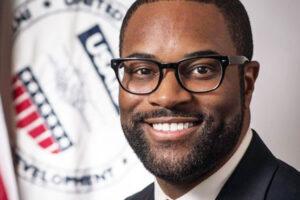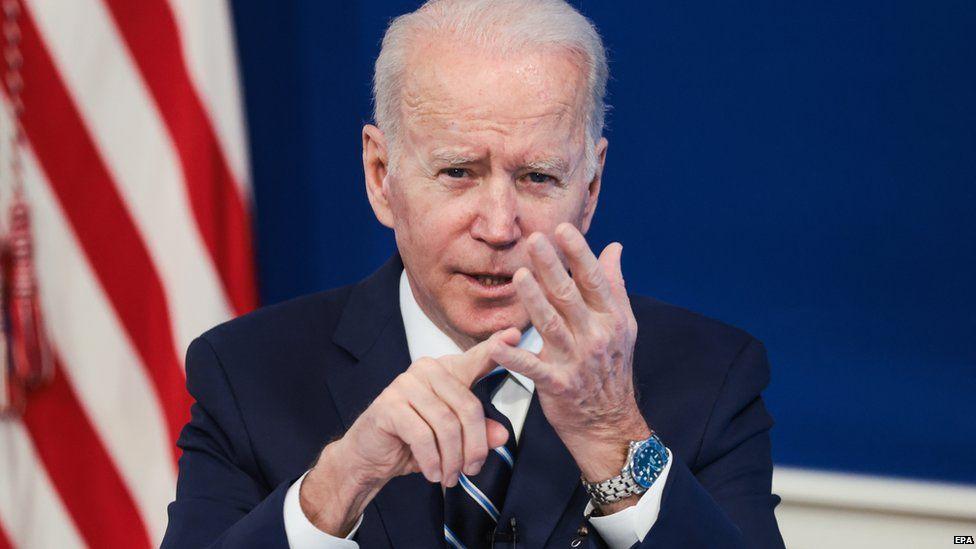A year of progress on global LGBTQ rights, but so much remains to do
Kikonyogo Kivumbi is the executive director of the Uganda Health…
COMMENTARY: U.S. support of worldwide LGBTQ rights during the first year of the Biden administration led to “significant progress” but “there is far to go”, according to an analysis by the Council for Global Equality. a U.S.-based advocate for international recognition of the human rights of LGBTQ people.

One year ago this month (Feb. 4, 2021), President Biden signed the “Memorandum on Advancing the Human Rights of Lesbian, Gay, Bisexual, Transgender, Queer, and Intersex Persons Around the World,” his first major action calling for U.S. foreign affairs agencies to advance LGBTQI rights.
It was issued on the same day that President Biden delivered his first major foreign policy speech, and both the Memorandum and the speech clearly embed LGBTQI rights within U.S. human rights policy and diplomacy as never before.
Below is an analysis of what has actually been accomplished, presented in modestly edited excerpts from an article by the Council for Global Equality (CGE):
Looking Back on the Biden Administration’s First Year of Global LGBTQI Engagement
Looking back over the past year, the Council for Global Equality (CGE) has seen significant progress but also recognizes there is far to go to deliver on the President’s historic promise.
Pending the release of the official first-year report [from the U.S. Department of State], CGE offers these observations on the progress that we’ve seen to date – as well as the priorities that clearly remain to be addressed under the leadership of the Presidential Memorandum.
Swift and meaningful actions
The Presidential Memorandum boldly calls for “Swift and Meaningful United States Responses to Human Rights Abuses of LGBTQI+ Persons Abroad.” This promise has been tested in an era of mass arrests, often under the guise of COVID pandemic restrictions, and targeted murders of LGBTQI individuals and activists. In the past year, the world witnessed mass detentions and criminal sentences targeting LGBTQI individuals in Cameroon, Ghana, Uzbekistan, and Uganda, along with multiple homicides across the Northern Triangle in Central America. The year also saw the introduction of discriminatory laws and policies targeting LGBTQI individuals in numerous countries.

On this front, the Biden Administration gets high marks for its diplomacy, and for quickly filling the role of Special Envoy to Advance the Human Rights of LGBTQI+ Persons. Special Envoy Jessica Stern has provided particularly useful expertise for bilateral engagement.
With support from the Special Envoy and the human rights bureau at the State Department, senior officials and U.S. embassies have spoken out regularly and forcefully against abuses – although U.S. authorities still seem disappointingly reluctant to call out abuses in some countries where the United States has particularly complex strategic interests, like Egypt. Nonetheless, coordinated U.S. diplomacy, often behind the scenes, when necessary, helped mitigate many dangerous LGBTQI crisis situations over the past year – and potentially helped head off anti-LGBTQI legislation in a few countries, at least temporarily.
The Presidential Memorandum also instructed U.S. diplomats to “strengthen existing efforts to combat the criminalization by foreign governments of LGBTQI+ status or conduct.” The outcomes here are less clear, but possibly for good reason. U.S. diplomats often need to lead with “quiet diplomacy” as they encourage other countries to decriminalize – no country wants to be shamed publicly, and moralistic tirades delivered by smug diplomats can be counterproductive.
All the same, CGE hopes to see significant progress on this leading decriminalization objective across the four years of the administration, and that will take a comprehensive plan, additional funding, and ongoing commitments at the highest levels.
Courts in Botswana finalized that country’s move to decriminalize last year, and several other cases are proceeding in the Caribbean and around the world. Quiet but determined U.S. diplomatic support will be important in the years ahead. CGE will continue to look to the State Department’s diplomats, including Special Envoy Stern, to coordinate with U.S. embassies to ensure quiet support for decriminalization and “swift and meaningful” responses to acute human rights abuses.

Refugee protection
The Presidential Memorandum called on U.S. officials to identify and expedite refugee resettlement for the most at-risk LGBTQI refugees. A parallel Executive Order – issued on the same day last year – revived the U.S. refugee resettlement program, which was largely dismantled under the Trump Administration.
In addition to returning U.S. refugee admissions to historic levels, the Executive Order attempts to streamline and expedite the entire resettlement process, allowing NGOs to play a critical new partnership role, while calling on the State Department to “enhance access to the refugee program for people who are more vulnerable to persecution, including women, children, and other individuals who are at risk of persecution related to their gender, gender expression, or sexual orientation.” The Executive Order also created a new process to recognize the unmarried same-sex partners of refugees to allow them to resettle to the United States together. That is an important recognition of the complexities of LGBTQI relationships in countries that criminalize rather than sanctify same-sex relationships.
Over the past year, the State Department’s refugee bureau prioritized efforts to expedite protections for LGBTQI refugees, including an innovative new community sponsorship program to allow community groups to sponsor refugees and support their resettlement. CGE hopes this will provide a platform for LGBTQI-affirming religious congregations and LGBTQI community centers, for example, to support LGBTQI refugees and guide them in their adjustment to a new life and home in the United States. The refugee bureau also is piloting a new program to allow direct NGO referrals into the U.S. refugee program, and this hopefully will include referrals by LGBTQI-led civil society groups with connections to LGBTQI refugee communities abroad.
The main refugee story over the past year, however, involved haphazard efforts by the U.S. and allied governments to protect Afghan refugees in the aftermath of a messy withdrawal from Afghanistan. … Much more can and must be done to support LGBTQI and other vulnerable refugees from Afghanistan in the coming year, including additional resettlement options into the United States.
The Biden Administration’s asylum policy, in contrast, especially relating to the refugee crisis on our southern border, has been far more disappointing. President Biden’s border policies have hardly diverged from Trump Administration policies, particularly as they relate to the misuse of Title 42 and the maintenance of the remain-in-Mexico policy (MPP). And there are still at least 20,000 immigrants in ICE detention centers, where we know LGBTQI immigrants have experienced prolonged mistreatment and even death. Presumed detention of immigrants must end in this Administration. Unfortunately, the Biden Administration’s policies at the southern border represent a disheartening abdication of commitments made in the Presidential Memorandum and by then-candidate Biden on the campaign trail.
Funding and enforcing the President’s global LGBTQI agenda abroad
The Presidential Memorandum called for an expansion in global LGBTQI funding to meet the President’s political commitments. Last year, 142 Members of Congress and 85 civil society organizations called for global LGBTQI funding to increase to $60 million to meet those commitments. In response, Congress earmarked global LGBTQI funding at $25 million, missing the $60 million target by a dramatic $35 million. The President’s 2023 budget needs to request – and the Biden Administration needs to work with Congressional appropriators to support – the full $60 million funding threshold. Anything less than that calls the President’s commitments into question.

Once adequate funding is secured, CGE looks forward to working with the State Department’s innovative Global Equality Fund and USAID’s LGBTQI leadership team, including Jay Gilliam, the new Senior LGBTQI+ Coordinator at USAID, to deploy funding quickly and effectively to local civil society groups fighting for the rights and livelihoods of LGBTQI communities globally. The funding needs are immense but the potential dividends on U.S. investments are equally extraordinary.
Additionally, through U.S. funding and political leadership at the World Bank and in the regional development Banks, the Biden Administration has the opportunity to deliver a new inclusion agenda that recognizes excluded LGBTQI minorities. World Bank and other studies have already demonstrated that socioeconomic exclusion of LGBTQI people undermines development and limits a country’s macroeconomic growth, whereas LGBTQI inclusion is directly correlated to increased GDP per capita and higher value in human development. It is time to translate that data into meaningful investments in LGBTQI livelihoods and full economic inclusion through international financial institutions.
The Presidential Memorandum also mandates that “agencies involved with foreign aid, assistance, and development programs should consider the impact of programs funded by the Federal Government on human rights, including the rights of LGBTQI+ persons, when making funding decisions.” Much more remains to be done to secure that commitment. Credible reports surfaced last year suggesting that U.S.-funded health clinics in Uganda were referring LGBTQI patients for psychologically harmful conversion therapies, in violation of U.S. policy and the U.S. commitment to do no harm. …
Multilateral diplomacy to advance LGBTQI rights
… The Biden Administration hosted a virtual Summit for Democracy in December 2021 for 110 countries, which is to be followed by an in-person summit in 2022. It is critical that metrics be established to ensure that those invited to the phase-two Summit show broad and specific progress toward democracy, human rights, and LGBTQI inclusion.
CGE and other democracy and human rights groups have called on the Biden Administration to weigh actions by each of the 110 participating states as part of the “year of action” between the two summits, including efforts by each of the governments to promote the rights and democratic participation of their LGBQI citizens. To assist in this effort, CGE produced “report cards” marking LGBTQI commitments and progress toward LGBTQI equality goals in each participating country in advance of the 2021 Summit. All countries, including the United States, should commit to improving their scores before CGE issues new report cards during the next Summit.

Rescinding inconsistent policies
The Presidential Memorandum also directed foreign affairs agencies to “take steps to rescind any directives, orders, regulations, policies, or guidance inconsistent with this memorandum.” Here, too, decisive early announcements rejecting Trump Administration policies were important but additional work remains.
Secretary Blinken squarely repudiated Secretary Pompeo’s unbalanced Unalienable Rights Commission, which sought to create a dangerous hierarchy of rights. And the President ordered the United States formally to withdrawal from the so-called Geneva Consensus Declaration, which was an anti-LGBTQI, anti-abortion, and anti-sexual and reproductive rights manifesto that was written and supported by the Trump Administration with enduring diplomatic consequence. Indeed, as recently as late 2021 conservative members of the U.S. Congress celebrated Guatemala and Russia’s decision to join the Geneva Consensus, even as U.S. diplomats sought to distance us from it. Unfortunately, these anti-rights, anti-LGBTQI documents remain very much alive today and continue to be championed by countries that seek greater coordination in their efforts to oppose sexual and reproductive rights, including most significantly the rights of transgender persons through global “anti-gender” movements and using so-called “parental rights” arguments. …
Significant progress but far to go
The Biden Administration has charted important progress in advancing principled human rights leadership, multilateral coordination, and an integrated approach to development and human rights. Importantly, the President has repeatedly noted, as he did in his first foreign policy speech a year ago today, that there is “no longer a bright line between foreign and domestic policy,” and that when we defend LGBTQI and other rights abroad we also are securing those rights at home.
CGE looks forward to additional progress in advancing the Presidential Memorandum in the year to come, while simultaneously ensuring even greater integration of U.S. domestic and foreign policies to achieve greater equality based on race, sex, gender identity, sex characteristics, and sexual orientation at home and abroad.
At the end of the speech last year, President Biden noted that “we are a country that does big things.” CGE looks forward to a continued partnership with the Biden Administration to go big and to promote the rights of LGBTQI persons everywhere. That is a very big thing.




Qtalk plea: My lover started dating my best friend. What can I do?